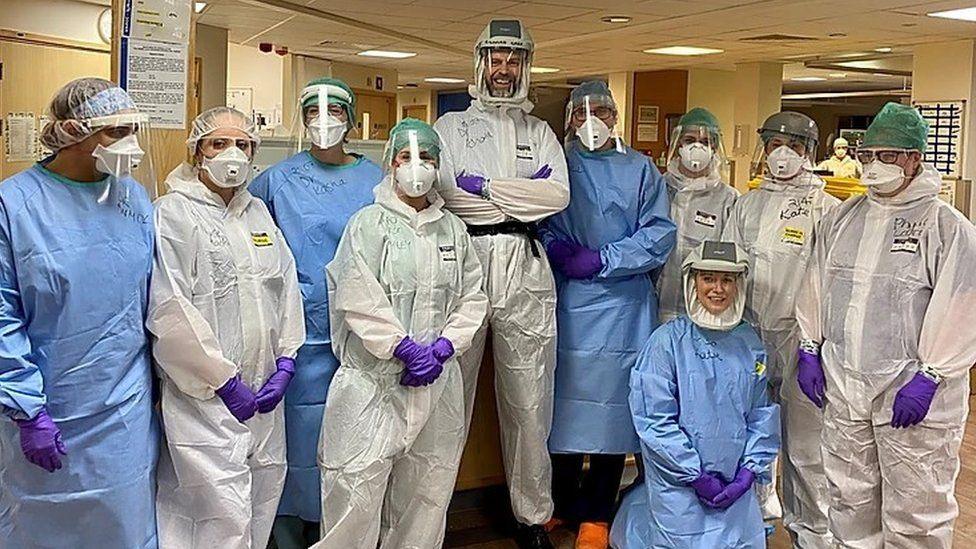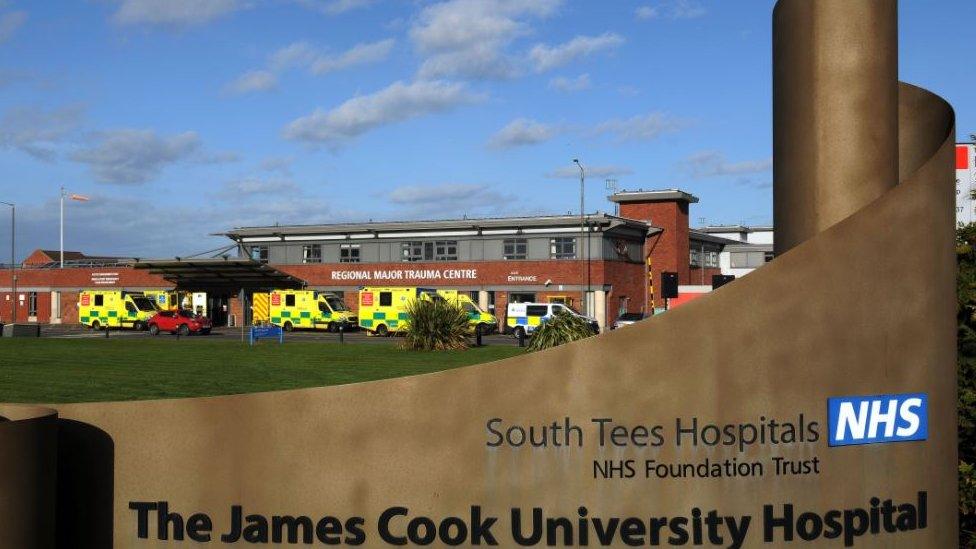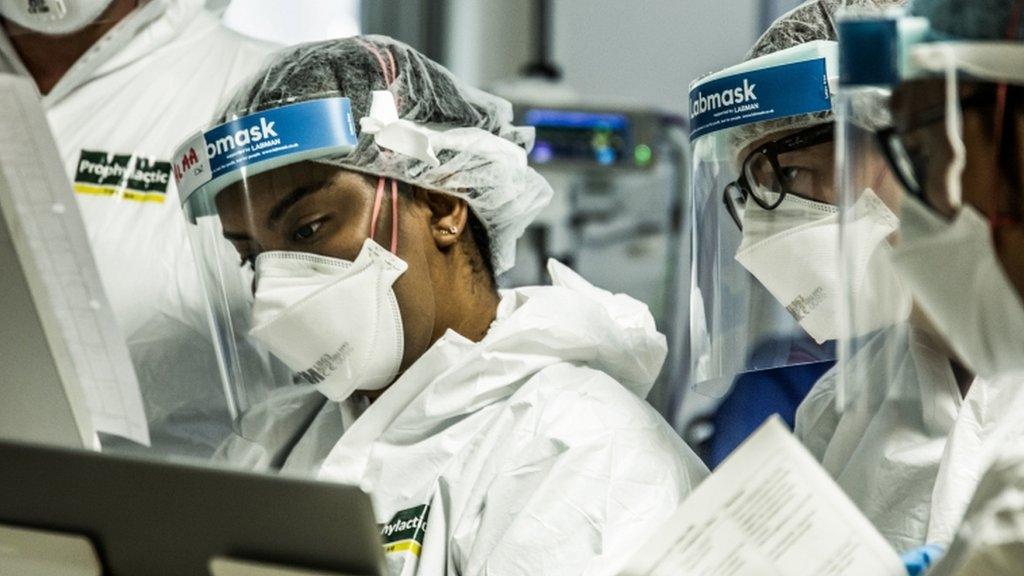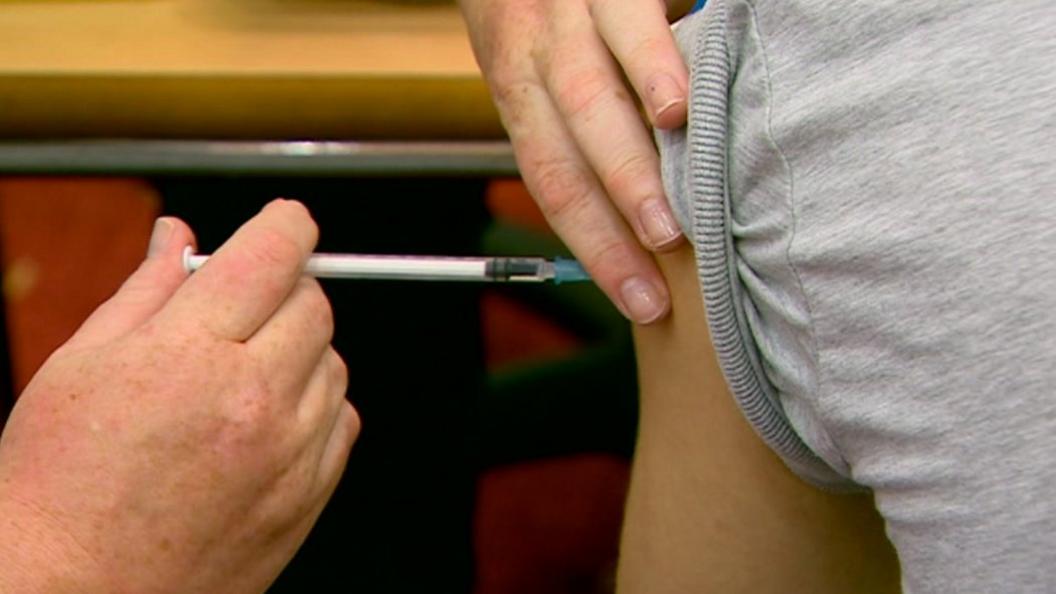Covid: Middlesbrough consultant optimistic about Omicron wave
- Published

Richard Cree (fifth from left), pictured in January 2021, said there was no doubt the Omicron variant is "far less severe than its predecessors"
It is looking increasingly likely we can "ride out the Omicron wave", a hospital consultant has said.
Dr Richard Cree, who works in Middlesbrough and has blogged through the pandemic, said he had feared the number of patients being admitted with the variant would be higher.
However, his comments come as the town has the highest rate of Covid infections in England.
Nationally, figures from the government show Covid cases are falling.
Dr Cree, an intensive care consultant who works at the James Cook University Hospital, wrote in his latest post, external: "Across the country, the number of people being admitted to hospital following infection remains high.
"However, the number of people being admitted hasn't risen as high as I feared it might and it may even be starting to plateau.
"I will admit that I thought things might be worse by now but I'm all too happy to be proved wrong.
"It's looking increasingly likely that we may be able to 'ride out' the Omicron wave after all."
In Middlesbrough, figures up to and including 7 January showed there were 3,111 people per 100,000 infected with Covid, a rise of 63% on the previous week.
'Stupid-busy'
Dr Cree said while the hospital remained busy, the situation had improved.
"A&E has gone from being bonkers-busy to just stupid-busy," he wrote.
"We now have four Covid wards and it is proving difficult to find a non-Covid bed when you need one but, overall, the hospital is coping."

Dr Cree said although the hospital was still busy it was coping with four Covid wards
He said said people continued to die - indeed, staff were greatly saddened by the recent death of a young patient from Covid they had tried so hard to save.
He added: "There is now no doubt that the Omicron variant is far less severe than its predecessors.
"In many respects, this fourth wave feels like it is due to a different virus.
"Most of the patients who have required admission to the Covid Intensive Care Unit are relatively young and unvaccinated.
"The few vaccinated patients that we are admitting have either not received a booster dose or have significant existing medical problems that cause them to be immunosuppressed."
As of 11 January, there were 142 people in the James Cook University Hospital with Covid, according to Hilary Lloyd, the chief nurse at South Tees Hospitals NHS Foundation Trust.
Mr Nicholson said: "The rate of deaths to infection rate is a lot lower than when we have had previous lockdowns and restrictions."
'Remarkable transmissibility'
While there had been an increase in patients requiring hospital treatment, the numbers in intensive care remained low, Dr Cree said.
On Tuesday there were seven Covid patients at his hospital's ICU with three on ventilators.
But staff sickness levels due to Omicron remained a concern, with medics working longer hours to cover colleagues' absence, he said, leaving him surprised by the virus's "remarkable transmissibility".
He wrote: "Many ICU doctors and nurses will have caught the original strain back in the spring of 2020 and we have all received three doses of the Pfizer vaccine since then.
"Despite wearing PPE all the time, most of us will have been topping up our antibody levels every now and then as a result of inadvertent exposure.
"There can't be many people with better immunity, surely?
"Whilst no-one has been anything other than mildly unwell, the fact that so many of us have been infected is a testament to Omicron's remarkable transmissibility, even in a highly-immune population."

Follow BBC North East & Cumbria on Twitter, external, Facebook, external and Instagram, external. Send your story ideas to northeastandcumbria@bbc.co.uk, external.
Related topics
- Published12 January 2022
- Published10 January 2022

- Published6 January 2022

- Published22 March 2021
